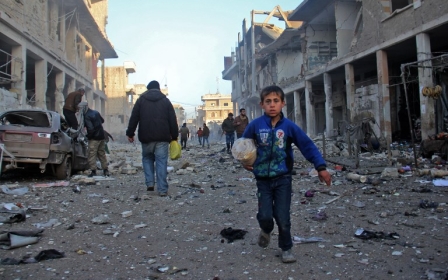Syria demands 'immediate' withdrawal of Turkey troops

Syria on Saturday demanded the "immediate and unconditional withdrawal" of Turkish troops that have deployed in the country's northwestern province of Idlib, state media said citing a foreign ministry source.
Turkish troops entered Idlib on Thursday night as part of efforts to enforce a so-called "de-escalation zone" agreed by rebel backer Ankara and regime allies Russia and Iran at talks in Astana earlier this year.
But the Syrian foreign ministry source slammed the "Turkish aggression," saying it had "nothing whatsoever to do with the understandings reached by the guarantor countries in the Astana process".
Turkey announced on Friday it had deployed scores of soldiers in Idlib in a bid to stop the fighting there.
The deployment also appeared to be aimed at preventing the expansion of Syrian Kurdish militia backed by the United States but considered by Ankara to be "terrorists".
Over 100 soldiers, including special forces, and 30 armoured vehicles entered the northwestern Syrian region, Turkey's Hurriyet daily reported on Friday.
More troops could be sent there in the next few days, the paper said.
In a statement on Friday, the military said it had begun "activities to establish observation posts on October 12".
President Recep Tayyip Erdogan said Turkish troops had entered Syria with the Free Syrian Army, the name Ankara uses for rebels seeking to remove Syrian President Bashar al-Assad.
"We said we would come unexpectedly in the night, and last night ... we started the operation," Erdogan said during a televised speech in Ankara.
"It is us who have a 911-kilometre-long border with Syria, we are the ones threatened," he thundered.
Idlib is largely controlled by Hayat Tahrir al-Sham (HTS), a group led by al-Qaeda's former Syria affiliate, which has forced out more-moderate rebels in recent months.
The deployment comes days after Turkish troops launched a reconnaissance mission as part of efforts with Russia and Iran to set up a de-escalation zone - as agreed in May at the Astana peace talks aimed at ending the Syrian war.
Turkey says it is backing Syrian rebels in a bid to oust HTS members in the area and allow Iranian, Russian and Turkish forces to implement the zone.
They agreed on four such ceasefire zones in Syria as a prelude to negotiations.
Fortifying positions
Three zones are already in place - in Eastern Ghouta near Damascus, in central Homs, and in parts of southern Syria - which are being monitored by Russian military police.
The fourth de-escalation zone includes Idlib and also parts of the neighbouring Latakia, Hama and Aleppo regions.
The operation's official target is the HTS, but Britain-based Syrian Observatory for Human Rights head Rami Abdel Rahman told AFP the Turkish forces were escorted by HTS elements, suggesting a degree of coordination between them.
"The Turkish military appears to have been talking with Tahrir al-Sham, trying to avoid clashes and find an arrangement that both can live with," Aron Lund, a fellow with The Century Foundation, told AFP.
While Turkey supports Syrian opposition fighters and calls for Assad's removal, Ankara has worked closely in the last few months with Russia - which supports Assad - in the hope of bringing the war to an end.
Idlib is one of the last major areas of Syria beyond the control of the government, which has recaptured vast areas of territory from opposition fighters since Russia intervened on the Assad government's behalf in September 2015.
The Syrian conflict began after widespread protests against the government in 2011 but has since turned into a multi-front war that has killed more than 330,000 people.
Stay informed with MEE's newsletters
Sign up to get the latest alerts, insights and analysis, starting with Turkey Unpacked
Middle East Eye delivers independent and unrivalled coverage and analysis of the Middle East, North Africa and beyond. To learn more about republishing this content and the associated fees, please fill out this form. More about MEE can be found here.




